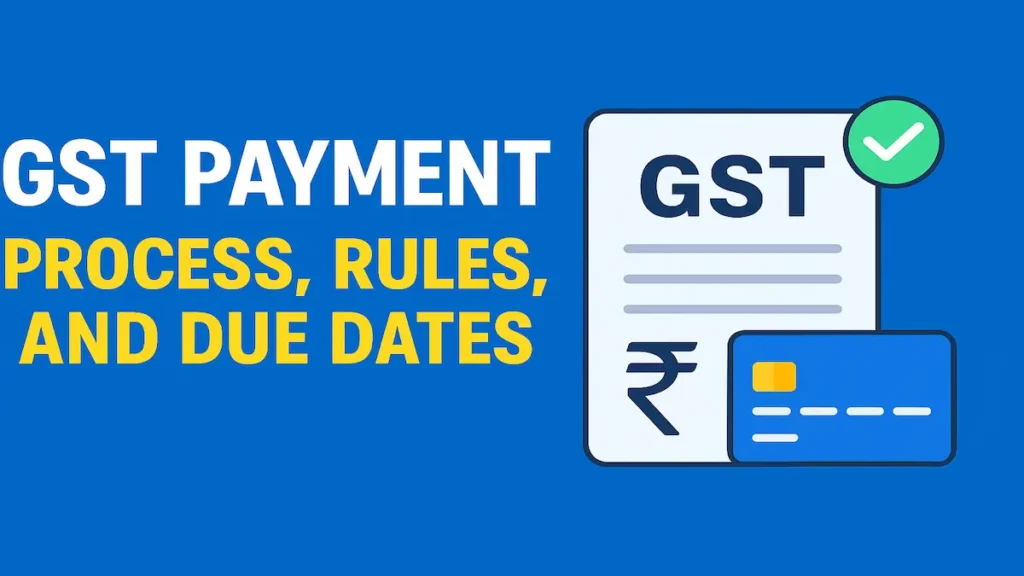The Goods and Services Tax (GST) is one of the biggest tax reforms in India. It replaced many indirect taxes and brought them under one system. Every business registered under GST has to pay tax regularly. This payment is called GST Payment. It is an important part of filing returns and staying compliant with tax laws.What is GST Payment?
GST payment is the process of depositing the tax collected by a business to the government. The tax is divided into three parts. The first is Central GST (CGST) which goes to the central government. The second is State GST (SGST) or Union Territory GST (UTGST), which goes to the state or UT government. The third is Integrated GST (IGST) which applies when goods or services move from one state to another.
A taxpayer has to calculate how much tax is payable every month or every quarter. The calculation depends on sales, purchases, and the type of business. After calculation, the amount must be paid before filing the GST return.
When Should GST Be Paid?
The timing of GST payment is linked to the return filing due dates. For most taxpayers, GST is paid on a monthly basis. In such cases, the tax must be deposited before the 20th of the next month while filing GSTR-3B.
There is also a QRMP (Quarterly Return Monthly Payment) scheme. In this scheme, small taxpayers can file returns quarterly but must pay tax every month. The due date for such payments is usually the 22nd or 24th of the following month, depending on the state.
If payment is delayed, interest and late fees are charged. The interest rate is usually 18% per year on the outstanding amount. Late fees are charged per day, which increases the burden on the taxpayer.
How to Pay GST?
The process of paying GST is simple and completely online. A taxpayer has to visit the official portal, www.gst.gov.in, and log in with valid credentials. After login, the following steps are followed:
- Go to the Services menu.
- Select Payments → Create Challan.
- Enter the amount of tax, interest, or penalty, if applicable.
- Choose the payment method. Options include net banking, debit card, credit card, NEFT, RTGS, or over-the-counter at authorized banks.
- Generate the challan. A unique number called CPIN will be created.
- After successful payment, a Challan Identification Number (CIN) will be generated. This acts as proof of payment.
Taxpayers can also pay offline through banks, but the over-the-counter option is limited to ₹10,000. Most businesses prefer online payment as it is faster and safer.
Why Is GST Payment Important?
Timely GST payment ensures smooth compliance with tax laws. It avoids penalties, late fees, and legal notices. Businesses that fail to pay GST may face problems in future tax filings. Non-compliance can also affect business reputation and government contracts.
GST is also a way for the government to collect revenue fairly. It ensures that taxes collected from customers actually reach the government. Without proper payment, the entire system can face disruption.

Recent Posts
Important Bank Holiday Trading Hours Update – January & February 2026
Tata Power-DDL launches Solar Sakhi Abhiyan
Next-Gen GST Reform: A Historic Diwali Gift for the Nation
Angel One Stock Broker Review
Income Tax Alert: ITR Filing Last Date for FY 2024-25 (AY 2025-26)
TikTok in India: The Buzz, the Ban, and What’s Really Happening
Wordle Answer Today (August 20, 2025): Hints and Full Solution Explained
Google Expands Store in India and Faces Global Play Store Challenges
Ola Electric Shares Recover Strongly After Heavy Fall in 2025
Gold Price Today: Rates Fall as Strong Dollar Impacts Market
Shreeji Shipping Global IPO Sees Strong Demand, GMP Suggests Listing Gains
India Approves ₹62,000 Crore Deal for LCA Tejas Mark 1A, HAL Shares Gain